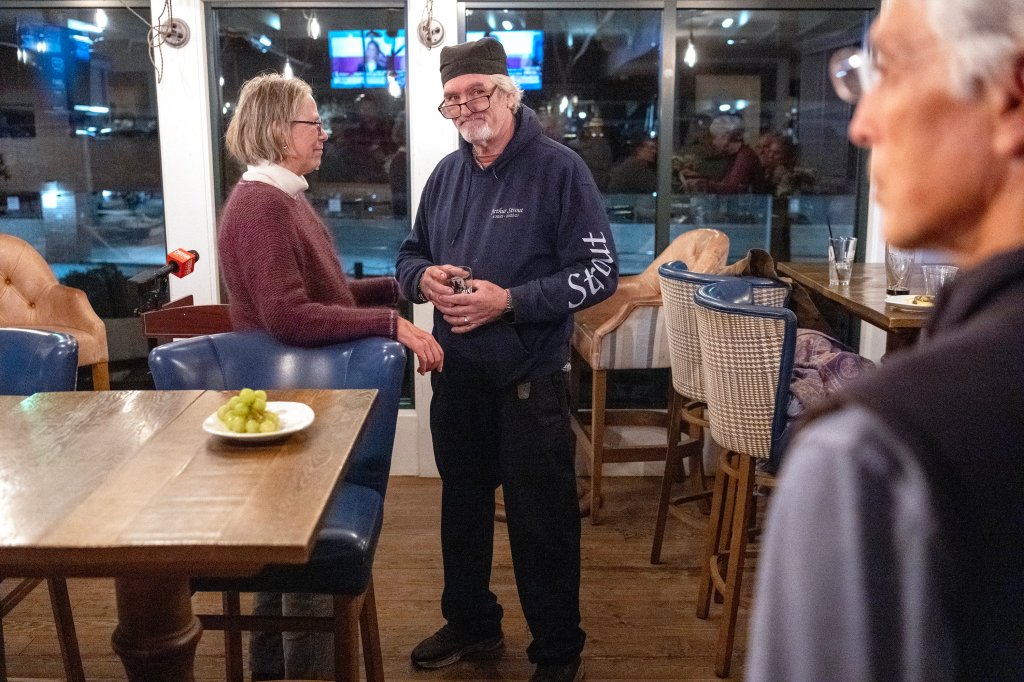
Two years after the worst mass shooting in Maine’s history, voters approved landmark gun safety legislation Tuesday making it easier to confiscate firearms from people in crisis.
The new red flag law was approved by a margin of 63% to 37% with 96% of votes counted.
The law allows family members in addition to police to petition courts to temporarily remove weapons from a person who poses a risk to themselves or others. It also eliminates the need for a mental health evaluation as is required under Maine’s current yellow flag law.
Around the time lawmakers approved the yellow flag law in 2019, they also discussed but ultimately rejected a red flag proposal. Advocates then made another push following the 2023 mass shooting in Lewiston that killed 18 people and injured 13 others — an event that both supporters and opponents of the new law said on Wednesday factored into its ultimate passage.
“After Lewiston there was just such horror and shock that people were really motivated to do something to figure out how we could prevent that from happening again,” Nacole Palmer, executive director of the Maine Gun Safety Coalition, said in an interview Wednesday.
The effective date for the new law has not yet been set, and opponents said Wednesday they are looking into the possibility of a legal challenge.
Supporters, meanwhile, were celebrating a long-awaited victory that they said will make Maine communities safer and expressed confidence that the law will survive any possible challenges.
OPPONENTS CITE LACK OF FUNDING, PUBLIC OPINION
David Trahan, executive director of the Sportsman’s Alliance of Maine, one of the leading opponents of the proposal, said Wednesday that while he was disappointed in the outcome, he was not surprised.
“We didn’t have any money and we had no national support,” Trahan said. “They had a lot of national money. I just couldn’t reach enough people to educate them on the issue.”
Proponents of the measure raised and spent over $800,000 this election cycle, while opponents raised and spent just over $100,000. About 41% of money raised by supporters came from out of state and included large donations from groups such as Giffords, the Global Impact Social Welfare Fund and the Alliance for Gun Responsibility.
Trahan believes that the other referendum on statewide ballots — an election reform proposal that would have put in place voter identification requirements and made changes to absentee voting — may have brought out more voters inclined to vote in favor of the red flag proposal.
But also believes the Lewiston shooting was a “game changer” in public opinion.
“What I heard a lot in the field was, ‘We don’t think (the red flag proposal) is perfect, but we have to do something,'” he said.
PROPOSAL RESONATED WITH LEWISTON RESIDENTS
In Lewiston, which is still trying to heal from the Oct. 25, 2023, shooting, supporters said the law is a necessary backstop following clear evidence the yellow flag law is not enough.
Dr. Joe Anderson, who was in the emergency room at Central Maine Medical Center the night of the shooting, has been involved with efforts to enact gun policy changes and said Tuesday’s election was the result of Mainers knowing that a red flag law, also known as an extreme risk protection order, is necessary, especially after the Legislature failed to enact such a law.
In Lewiston, 68% of voters supported the red flag law proposal, approving it 6,027 to 2,866. Yes on 2 also won handily in neighboring Auburn, where it got 65% of the votes, 4,319 to 2,342.

“I think people in the Lewiston-Auburn area knew the details of the story and were more invested,” Anderson said. “I think they really knew that a red flag law could have prevented the shooting in Lewiston.”
Michael Rocque, a Maine native and professor of sociology at Bates College, was expecting the results to be much closer, but in hindsight said maybe he should’ve seen it coming.
“It’s not just that we had a mass public shooting for the first time in our state, but the fact that we had this yellow flag law and yet there was very clear and consistent evidence that it just didn’t work in this case,” he said, referring to findings from a state commission that investigated the shooting and determined that the yellow flag law could have been used on shooter Robert Card.
Rocque said it’s been interesting to see the change in attitudes toward gun control policy in Maine. A decade ago, there was virtually no gun control legislation. Now, he said, he’ll be watching how the yellow and red flag laws co-exist. A number of states have enacted such laws and while many have been challenged in court, they have largely held up, he said.
POSSIBILITY OF LEGAL CHALLENGE PENDING
Trahan, from the Sportsman’s Alliance of Maine, said he will be speaking with lawyers over the next few days and “if there’s a path to a legal challenge we will seriously look at it.”
Meanwhile, Palmer, from the Maine Gun Safety Coalition, said she would not be surprised by a lawsuit because “that’s what the gun lobby almost always does.” But she noted that Tuesday’s vote makes Maine the 22nd state to enact a red flag law.
“These laws have been challenged before, and their constitutionality has been upheld,” Palmer said. “So I’m not worried about the outcome of the case, if it happens.”
Palmer said she is relieved the proposal passed, though it was frustrating that lawmakers didn’t act sooner — something she blamed on Gov. Janet Mills’ influence. Mills, a Democrat, opposed the red flag law, arguing in part that private citizens should not have to navigate what can be a complicated legal process and that law enforcement is better suited to respond.
On Tuesday, after it was clear Question 2 would prevail, Mills said her administration would work with law enforcement and the public to implement the new law.
Palmer said her group will continue to help educate Mainers.
“But I do want to push back on the idea that Maine people are somehow incapable of figuring out processes that are new to them,” she said. “Maine people are smart and savvy, and if the life of their loved one is on the line, I’m sure they’re going to do what they need to do and what the law now allows them to do.”


We invite you to add your comments. We encourage a thoughtful exchange of ideas and information on this website. By joining the conversation, you are agreeing to our commenting policy and terms of use. More information is found on our FAQs. You can modify your screen name here.
Comments are managed by our staff during regular business hours Monday through Friday as well as limited hours on Saturday and Sunday. Comments held for moderation outside of those hours may take longer to approve.
Join the Conversation
Please sign into your CentralMaine.com account to participate in conversations below. If you do not have an account, you can register or subscribe. Questions? Please see our FAQs.